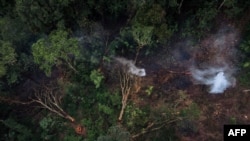A new report accuses a Chinese company of illegal deforestation in Congo, but there’s debate over which country is responsible.
Over a six-month period last year, Congo King Baisheng Forestry Development exported $5 million – or about 30 million kilograms — in illegally logged hardwood to timber conglomerate Wan Peng through Zhangjigang Port, the environmental watchdog Global Witness found in its report.
The DRC's Environment Ministry did not respond to questions about the findings, while the Chinese Embassy in Washington, D.C., stressed that China places "great importance on protecting the environment." The embassy declined to comment on the specific case in question.
“It is worth mentioning though, that the Chinese government always instructs the Chinese companies abroad to abide by local laws and regulations. That is our consistent position,” said an embassy spokesperson in an email to VOA.
But the Global Witness report made it clear that while there may be laws on paper preventing logging concessions in DRC, they were often ignored.
Since 2002 there has been a government moratorium on new logging in the DRC due to the corruption in the sector, Global Witness said, but “despite this, vast swathes of forest have continued to be allocated to loggers in violation of the country’s own laws.”
A paradox
The report also pointed to the fact that in April 2022 the Congolese government suspended five concession agreements it had awarded to Congo King Baisheng Forestry Development or CKBFD, but logging continued in at least two of the concessions. After the suspension, between June and December, the company made $5 million in exported logs, it said.
When sent the evidence collected by Global Witness, Chinese Customs told the NGO that “as the logging has taken place in DRC and violated local laws, the DRC authority was responsible for enforcement.” The Chinese government could investigate evidence of Chinese companies or citizens being involved in illegal logging – if requested by the DRC government.
This creates a paradox, analysts told VOA.
“The Chinese government always preaches its companies to abide by the law, but in reality, the law is not always followed, especially in countries with weak governance…. In countries like DRC, laws are often negotiable with bribery,” Yun Sun, director of the China program at the Stimson Center, told VOA.
“Beijing’s attitude is ‘we cannot be responsible for the law-making or law-enforcement of another country’, and ‘a few bad apples of Chinese companies do not equate the Chinese government,’” she added.
Christian Geraud Neema Byamungu, Africa Editor at the China Global South Project, himself Congolese, echoed this.
“From China's perspective, in this case, they're not responsible, each country is responsible for what's happening,” he said.
“Since they're not backed by Beijing, there is absolutely no political reason for the DRC authorities not to implement and enforce regulations. But they're not enforced because these Chinese individuals are backed or working for powerful Congolese authorities who can prevent and protect them from any legal action.”
“So in that case, China's answer would be ‘How am I responsible? The DRC is letting powerful individuals help Chinese individuals break their country's rules,” wrote Byamungu to VOA.
Planting forests
The spokesperson for the Chinese Embassy told VOA that China has been making major efforts in afforestation at home.
“With four decades of afforestation, China has created the world's largest planted forests, doubling its forest coverage rate from 12 percent in the early 1980s to 24.02 percent in 2022. Based on NASA satellites date [data] at least 25 percent of global foliage expansion since the early 2000s came from China,” the spokesperson said.
When asked about China’s tree planting efforts, Charlie Hammans, an investigator on the Global Witness report, acknowledged China, which is the world’s largest carbon emitter, had seen some successes at home.
“China has made significant strides in decarbonizing its economy in the last few years and has set a net zero goal by 2060. However, this report makes clear that the behavior of companies in forest-rich countries such as CKBFD undermines the efforts of the country at home,” he said.
But Global Witness said there’s a loophole in China’s forest law, as it is not clear if it applies to imported timber.
“A clear strategy to address this imbalance should be to bring in strong laws to ensure products linked to deforestation cannot be imported into China, and Chinese banks who finance forestry and agribusiness beyond their borders should be required to carry out extensive due diligence to ensure they are not bankrolling bad actors linked to deforestation,” Hammans said.




